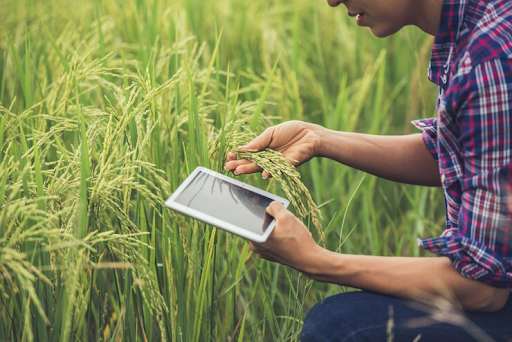Advances in automation and technology are restructuring the organic farming industry. Modern organic farming is fast changing due to the need for increased productivity, efficient use of resources, and environmental sustainability. The current organic farmer has turned to high-tech means of lowering his inputs and helping the crops get healthier as the market demand for organic produce increases day by day.
In this scenario, being updated on the most recent technological innovation is no longer an option but a compulsion. Let’s look at how automation and new tools are reshaping the organic future into a smarter, more sustainable, and highly efficient exercise.
1. Smart Sensors for Precision Agriculture
With smart sensors in organic farming, real-time insights about soil health, moisture levels, and crop conditions become possible. They track environmental variables such as pH levels in the soil, temperature, or humidity for organic produce. Farmers can thus decide how much water to apply or how much natural fertilizer to add. This saves resources, facilitates better care for crops, and encourages improvements in the quality of yield without organic standards being compromised.
2. Crop Monitoring and Pest Management through Drones
High-resolution cameras and sensors attached to drones can easily survey large fields for organic farmers. This bird’s-eye view helps in identifying issues in crop health due to nutrient deficiencies or pest infestations early on.
The variations in plant health, which otherwise would be invisible, can be picked up by a drone through multispectral imaging. This is of great use in organic farming, where conventional pesticides cannot be used. Here, with this information, farmers apply organic pesticides where necessary and thereby reduce the chemical contact with the plants and the soil. With this aspect, drone technology helps to balance pest control with sustainability to keep farms up to organic standards.
3. Robotic Weed Control Technologies
Weeding is a labor-intensive process, especially in organic farming, where synthetic herbicides are banned. Robotic weeding technologies, including the use of robotic weeders, are designed to remove weeds mechanically or with precision sprays of natural herbicides. These robots use the latest imaging and machine learning algorithms to differentiate between crops and weeds, thus minimizing damage to crops while selectively removing weeds.
4. Robotic Harvesters
At the global level, organic farming is finding its ultimate assistant in robotic harvesters while the shortage of labor faces agriculture. Equipped with vision systems powered by AI, the robots can pick up ripe fruits and vegetables to avoid damaging them in any way. It can particularly be useful for delicate crops like berries and tomatoes cultivated on organic farms.
Robotic harvesters are significantly useful for large-scale organic farms, where harvesting is carried out manually. This process is expensive.
5. AI-Driven Farm Management Platforms
AI-driven farm management platforms are transforming the way organic farmers plan, monitor, and optimize their farming activities. Aggregated from sources such as sensors and drones with weather forecasts, actionable insights are delivered through the platform. Therefore, the interface can be used to track crop development and soil conditions and schedule different activities on the farm.
It allows for evidence-based agricultural decisions that help the farmer adjust to fluctuating weather conditions and market requirements. Also, through AI and machine learning, these platforms evolve continuously to keep abreast of the latest organic farming technology that is compatible with environmentally friendly methods.
6. IoT-Greenhouse Automation
Organic farming thrives in an environment of a greenhouse where conditions for growing are better controlled than outside. The automation systems of IoT-enabled greenhouses allow temperature, humidity, light, and CO2 levels to be regulated remotely, bringing out optimal growth conditions of organic crops. Automated climate control reduces the need for synthetic inputs, which comes under the organic standards of requirement.
They also combine with soil and moisture sensors. They are energy-efficient as well, apart from giving more yield and making them sustainable in organic farming.
7. Blockchain for Transparency and Traceability
The organic farming market, in terms of advancing technology, is now more applicable when applied to increasing supply chain transparency and traceability. Applying blockchain allows tracing every step – planting, harvesting, and distribution in an organic farm. This increases consumer confidence in the origin and quality. The other side of the coin is that farming products are able to have a competitive advantage in the market.
Blockchain technology also simplifies the processes involved in certification, which is beneficial to organic farmers who have to abide by some strict regulatory norms. The credibility and reliability of the products are enhanced through integration with the latest organic farming technology.
8. Autonomous Tractors
GPS and advanced navigation systems transform the way organic farms operate their field activities. These self-driving tractors can plough, plant, and harvest with the least amount of human intervention. Autonomous tractors utilizing precision GPS guidance also provide minimal soil compaction with a reduction in fuel consumption, which are important objectives for organic farming that emphasize healthy soils.
This automation will ensure that organic farmers maintain soil integrity while reducing costs in labor and resource use. Autonomous tractors, in particular, come in handy for huge organic farms since it can be challenging to personally handle every section of the field manually.
Conclusion
The merger of automation and the latest organic farming technology is not only paving the way for sustainable agricultural life in the future but also gives the green growers some innovative tools by which they can enhance productivity without compromising on their environmental standards. For organic farmers, embracing such trends is not only good but essential to stay competitive in this emerging field.
ASQI is dedicated to the organic farming sector by designing solutions for organic farmers with the help of modern technological tools. Our objective is to empower farmers, inspire transparency, and improve sustainable agricultural practices.







